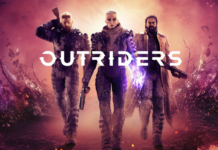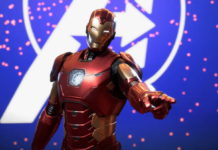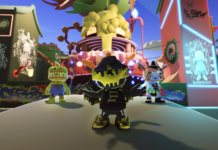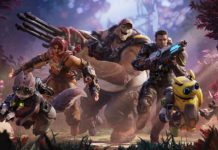Eureka Seve
Vol 1: The New Wave could be described as a mech battler meets third-person
exploration meets aerial acrobrats meets RPG story. That’s a mouthful, isn’t
it? I don’t think there’s a single genre that could sum up the amount of
variety this game is attempting to include.
Sumner
Sturgeon, one of many mech pilots, is intended to be the star of the game.
Though you may like him and the journey he’s about to embark on, it’s the
mechs themselves – called LFOs – that are the real star.

"LFO? That
sounds like an ill-faded boyband."
True, but
this game has nothing to do with crappy music. In Eureka Seven, LFO stands for
Light Finding Operations. They were created to harness transparent light
particles, providing lift by riding waves of trapars.
Confused? I
am too. The preview build was partially in Japanese, but I was able to make
some sense of it.
The LFO
machines are your mechs. They can walk, run, and hover like any other mech,
and also have the cool ability to transform into a tank-like vehicle.
Transforming enabled my enemies to avoid gunfire. My high-aimed blast went
right past a mech after it transformed. He either was already in the process
of transforming, or somehow knew I was about to attack, because the evasion
was a last-second move that saved a load of energy.
LFO controls
are a little different from the crowd. Whereas Virtual On has an unusual,
two-stick steering setup, and Armored Core has a more traditional third-person
shooter design, Eureka Seven has you push forward on the left analog stick to
accelerate. Pushing left does not yield the same amount of pressure (as it
would in a third-person shooter). All pushing left does is steer the LFO in
the other direction.
Tank
controls were very similar. In both cases the triangle button fires your
weapon, and the circle button activates a spin attack. During this attack the
mech, in standard or tank form, will stretch out its arms while it spins a
couple of times. The attack reaches close-range enemies, shaving off an extra
bit of their life while saving your valuable (and limited) ammunition.

The "lift,"
provided by so-called "trapars," appear to be the green beams of light I
spotted in the open air-board stages. Think of them as Tony Hawk and SSX with
only a handful of tricks. What’s cool about that? The air-board allows you to
fly wherever you please. Sail through the area and look for green beams
(that’s "beams," not a canned vegetable as it may sound), and you’ll be able
to float onto the beam for an increase in speed. It reminded me of Sonic’s
last racing game.
Are aerial
races and other time-based missions just ahead? It certainly seems that way.
Eureka
Seven’s visuals stand out for two reasons: they’re clean and clear, and appear
to be running at a much higher resolution than other recent mech titles. It’s
not a mind-blowing array of eye candy, but your eyes will enjoy the sweetness,
no doubt. LFOs are detailed, well-structured, nicely rendered, and look very
solid. And I don’t just mean that as a compliment. I’m literally saying that
the mechs look solid. As if you could walk up to them, punch one with your
bare hand, and break it in the process. That’s how the metal looks, tough and
painful.
Individual
characters – seen during story sequences (mostly real time), in between
battles, and during character-based missions – have distinct three-dimensional
anime appearance. They look like anime characters: big eyes, spiky hair,
pointy noses and tiny mouths that bob up and down while communicating. But all
the details are created in 3D, with tons of polygons applied to each
character. The finished product looks like what would happen if a bunch of
animators said, "Let’s update our anime. We want all the characters look as
they always have, only now they must be somewhat realistic and in 3D."

Circling store shelves like a UFO,
Eureka Seven will make its first landing on October 17th.Expect a ton of LFOs,
several confusing words (trapars!?), multiple gameplay types, a multitude of
missions, lengthy combat situations, long dialogue sequences, and more
boy-meets-girl developments than an episode of Boy Meets World.










